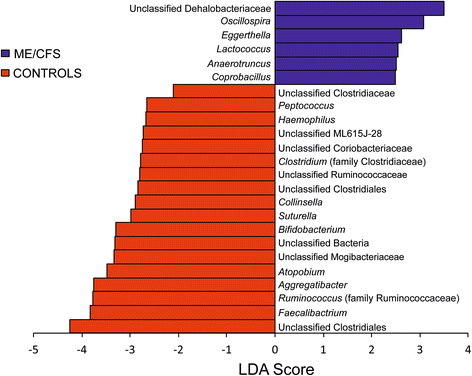Post-exertionally, Shukla et al. (2015) found that both blood and stool sample microbiota differed significantly in ME/CFS patients in the abundance of “several major bacterial phyla”, especially Bacilli in blood 48 hours post-exercise and Clostridium XIVa and IV (Firmicutes) in blood samples collected 15 minutes after exercise. Following exercise challenge,
“there was an increase in relative abundance of 6 of the major 9 bacterial phyla/genera in ME/CFS patients from baseline to 72 hours post-exercise compared to only 2 of the 9 phyla/genera in controls (p=0.005). There was also a significant difference in clearance of specific bacterial phyla from blood following exercise... in ME/CFS patients versus... controls” (Shukla et al., 2015).
Though this was a very small study, other studies have verified dysregulation in the intestinal microbiota in ME, CFS, or ME/CFS as defined by the CCC. Moreover, these findings were consistent with those in the previous study, featuring a significant dysregulation in the Firmicutes phylum in Norwegian ME patients over controls, including a fifty-fold decrease in Holdmemania, a 20-fold increase in Lactonifactor, and Bacteriodes genera Alistipes (Frémont, Coomans, Massart, & De Meirlier, 2013).
Recently, Giloteaux et al. (2016) measured plasma levels of hsCRP, lipopolysaccharides (LPS) as a marker for microbial translocation, and intestinal fatty acid binding protein (I-FABP) as a marker for GI damage. ME/CFS patients showed significantly higher LPS, sCD14, and plasma LBP.
“ME/CFS samples had a significant overall lower microbial diversity.... [which] differed at the phylum and family levels...” which were so distinctive that utilizing a machine learning approach, differences in bacterial populations could be used to accurately diagnose 82.93% of ME/CFS patients (Giloteaux et al., 2016). Giloteaux et al. also found dysregulation in Firmicutes gut populations in particular.

